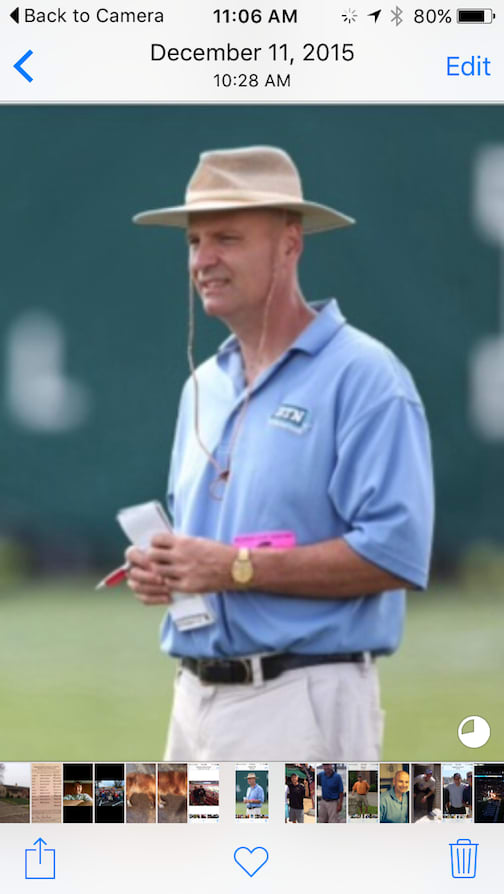Remember the date: September 7, 2019. On that day, Vanderbilt plays at Purdue, the Boilermakers’ home opener and second game of the season. What makes that a potentially momentous day? For the first time ever, you may be able to place a legal bet on a Purdue game in the state of Indiana.
A U.S. Supreme Court decision last year permitted states to enact sports gambling. Back in May, the Indiana state legislature passed a bill that would allow sports gambling, and the governor subsequently signed the bill into law on May 8.
At the moment, there are 22 states were sports gambling is legal or under consideration. The other Big Ten states which have legalized sports gambling or are considering it are Iowa, Pennsylvania, New Jersey, Illinois, Maryland, Michigan and Ohio.
Purdue is ready to educate its student-athletes and staffers. It always has been, according to Purdue associate athletics director for compliance Tom Mitchell.
“We are still trying to figure some things out from an education standpoint,” Mitchell told GoldandBlack.com last month. “We will be keeping the same things we have been doing, which is quite a bit of stuff. Now, the message will be tweaked.
“We also are looking in to bringing in a lot of different speakers. We may bring in someone from the gaming commission, the FBI. We have some feelers out and are trying to coordinate schedules.”
Indiana residents will be permitted to place wagers on professional and college sports as soon as Sept. 1, though some state regulators feel that is an aggressive timeline to launch according to a story in the Indianapolis Star.
Bets will be placed via smartphone or at a casino, horse-racing casino or OTB after patrons register online. Wagers could be placed by anyone 21 or older. However, Purdue student-athletes and staffers are forbidden from gambling and must sign ethical conduct statements.
"You can bet on any college sports or pro sports," said Mitchell. "State law allows it. But state law prohibits student-athletes and us as staff. It doesn’t exactly mirror the NCAA language, but it is pretty close."
Mississippi is a state the quickly embraced sports gambling. And Mitchell wanted to see how schools in the Magnolia State have handled it.
“I called down to Ole Miss and Mississippi State,” said Mitchell. “I said: ‘Look, you guys just went through this in your state. What are you doing?’ They said they weren’t doing anything different. They said what we are doing in some ways is more than what they are doing. It isn’t about doing more. It’s about tweaking the message to clarify for the athletes and the coaches and the staff.”
Mitchell said Purdue has fall and spring check-up meetings about gambling with student-athletes. In the premier sports, like football and men’s basketball, the school has postseason in-person meetings, too.
“We will send out e-mail and text reminders around big events like the Super Bowl, March Madness, the College Football Playoff,” said Mitchell. “I feel we are doing everything we should be doing.”
Cole Herdman played tight end at Purdue, finishing his career last fall. He will be in training camp with the Baltimore Ravens later this month. He said Purdue talked to its football players about the perils of gambling when he was on campus.
“They would tell us stuff like: ‘If you hear about it, stay away from it. Nothing good can come from it,’ " said Herdman. "That's kind of what I got from the coaches when I was there.”
A key question for Big Ten schools: Will the conference mandate that schools release weekly injury reports, like the NFL has done for years? Big Ten commissioner Jim Delany addressed that topic at last year's football media event in Chicago.
"I don't call it an injury report as much as I think about it as player availability,” Delany said last July. “Whether that comes out of an injury or comes out of eligibility or comes out of some transgression at one time or another, I think we need to do that. I think we need to do that nationally.
"The reason we need to do that is probably, with the exception of home field, the availability of personnel is critical to people who are interested in gambling legally or illegally. Therefore, when players are unavailable, we should know that -- that they're probable or likely.”
Herdman says Purdue staff discussed with the team how to handle injury information when he played.
“They always said to keep it confidential,” said Herdman. “Don’t ever tell media. Just keep it within the team, which I thought was always pretty basic. But now with gambling, it brings in a whole new way of thinking of things because we didn’t have to deal with sports gambling in the state when I was there.”
Another question: Will Indiana allow for prop bets, which are wagers on a player or specific event?
“We are hopeful that there won’t be,” said Mitchell. “Could there be close-out windows? Stopping betting before kickoff so there is a reduced risk of someone being in the stadium and having a way to influence a student-athlete?”
The education process is always on-going and evolving at Purdue.
“We will be keeping the same things we have been doing, which is quite a bit of stuff,” said Mitchell. "We all need to be more aware.”
Membership Info: Sign up for GoldandBlack.com now | Why join? | Questions?
Follow GoldandBlack.com: Twitter | Facebook
More: Gold and Black Illustrated/Gold and Black Express | Subscribe to our podcast
Copyright, Boilers, Inc. 2019. All Rights Reserved. Reproducing or using editorial or graphical content, in whole or in part, without permission, is strictly prohibited.
